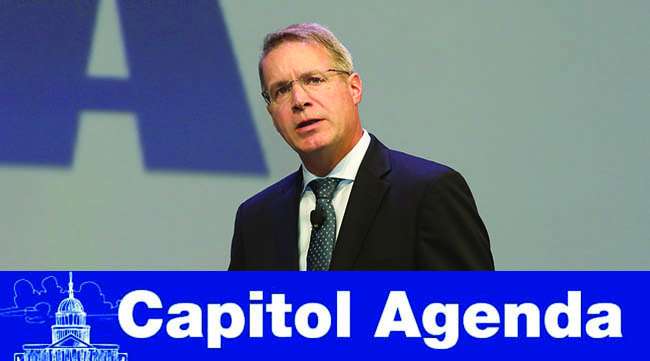Senior Reporter
Senate Commerce Committee to Review Supply Chains

[Stay on top of transportation news: Get TTNews in your inbox.]
Disruptions across a major refined petroleum pipeline, a growing crisis in semiconductor production affecting the automobile sector, and concerns with the distribution of vaccines and other critical supplies exposed vulnerabilities to the country’s supply chains.
As a result, the federal apparatus has been in response mode.
Due to the cyberattack against Colonial Pipeline, the Federal Motor Carrier Safety Administration recently signed off on an emergency declaration on hour-of-service regulations for truckers assisting operations linked to refined petroleum supply chains in the East Coast.

Mulero
The Commerce Department is among the agencies tasked with pursuing a comprehensive resolution regarding the global shortage of semiconductor chips. Earlier this year, President Joe Biden issued an executive order to examine supply chain concerns, which were evident during the early days of the COVID-19 pandemic.
On May 11, the Senate Commerce Committee is scheduled to take a closer look at operations across supply chains. Most Democrats on Capitol Hill say they anticipate Biden’s $2.25 trillion infrastructure policy proposal, if enacted, would improve the way domestic supply chains operate. Aspects of Biden’s proposal, referred to as the American Jobs Plan, await consideration in the House and Senate. In March, Commerce Committee Chairwoman Maria Cantwell (D-Wash.) issued a strong endorsement.
I will do everything I can to partner with President Biden and my colleagues to meet this moment.
Sen. Maria Cantwell
“As we recover from the COVID[-19] crisis, there is no better way to rebuild our economy and create jobs than by making long-overdue investments in our future. From upgrading our roads and bridges and prioritizing affordable housing to building out broadband, making our supply chains more resilient, and skilling our workforce for the 21st-century economy, the American Jobs Plan is a blueprint to meet these generational challenges,” the chairwoman said. “I will do everything I can to partner with President Biden and my colleagues to meet this moment and deliver a stronger and fairer economic future for all Washingtonians.”
While Democrats applauded Biden’s plan, Senate Republican leaders and the congressional bipartisan Problem Solvers Caucus each unveiled alternative policy frameworks.
American Trucking Associations President Chris Spear is among the stakeholders scheduled to update the Senate Commerce Committee on supply chains. ATA has pressed for federal funds that would enhance connectivity along freight corridors, and the group commended the Problem Solvers Caucus’ outline, primarily over its focus on user fees.
ATA Letter Caucus.df by Transport Topics on Scribd
“The proposal your caucus released not only offers realistic, concrete solutions to one of the most serious policy challenges facing our nation today,” Spear said, “but it also marks a return of political courage in Washington by expressing what the majority of lawmakers on Capitol Hill know to be true but few are willing to say: User fees are the most practical and politically viable solution to our infrastructure funding woes, and modernizing the federal fuel user fee offers the greatest return on investment over the next decade as we develop a long-term funding mechanism suitable to an increasingly decarbonized economy.”
The Week Ahead (All times Eastern)
May 11, 2:30 p.m.: The Senate Commerce Committee meets for hearing about supply chains with American Trucking Associations President Chris Spear. Watch live here.
May 13, 10 a.m.: Deputy Transportation Secretary Polly Trottenberg is scheduled to appear before the Senate Appropriations Committee for an update on transportation security matters.
Freight Corridor
With earmarks season underway, here’s a refresher.
Transportation Earmarks Guidelines by Transport Topics on Scribd
Legislative Docket

Pallone
House Democrats are aiming to advance legislation pertaining to electric vehicles, indicated Rep. Frank Pallone (D-N.J.), chairman of the Energy and Commerce Committee. The sponsor of the Climate Leadership and Environmental Action for Our Nation’s, or CLEAN, Future Act, Pallone has expressed support for initiatives that would facilitate the technology’s market access. The bill is meant to achieve net zero greenhouse gas pollution by 2050, with the goal of reducing pollution by 50% from 2005 levels by 2030.
During an Energy Subcommittee hearing May 5 Pallone said: “Electrifying the transportation sector is critical to meeting our climate goals. This is particularly important since we will be simultaneously working to decarbonize the power sector, which will result in [electric vehicles] becoming even cleaner in the future.”
 Buzz
Buzz

Elon Musk touted Tesla, space exploration and hyperlooping during his appearance on SNL.
Favorite Video
Biden administration officials continue to promote infrastructure policy.
Favorite Tweet
They’re baaaaack.
.@borenbears does it again. “You’ve got a creature that spends 17 years in a COVID-like existence, isolated underground sucking on plant sap, right? In the 17th year these teenagers are going to come out of the earth by the billions if not trillions." https://t.co/9uJLEyFI2I — Nancy Benac (@nbenac) May 5, 2021
The Last Word
The work from combating corruption to combating climate change will not be easy, and it is not new, and it could not be more important.
Vice President Kamala Harris on May 4, during the Virtual Washington Conference on the Americas
We publish weekly when Congress is in session. E-mail emulero@ttnews.com with tips. Follow us @eugenemulero and @transporttopics.
Want more news? Listen to today's daily briefing below or go here for more info:




